GABA and L-Theanine: Natural Calm for Boundary Setting
Introduction
Learning to set healthy boundaries is one of the most powerful acts of emotional self-care. It allows you to protect your time, energy, and peace—without guilt or fear. But for many people, especially those with co-dependent tendencies, setting boundaries feels terrifying. You might freeze, overexplain, or give in just to avoid tension. You know what you should say, but your body panics the moment you try.
This isn’t weakness—it’s nervous system overload. When the brain associates assertiveness with danger (because in the past, boundaries led to rejection or conflict), the body floods with stress hormones. The result? Anxiety, guilt, and the urge to please.
The good news is, the brain can be retrained—and natural compounds like GABA and L-Theanine can help calm that reactive state so you can stand firm with grace. These two nutrients support the very systems that regulate emotional calm and confidence, making it easier to speak up without fear or fatigue.
Let’s explore how GABA and L-Theanine help quiet the overactive mind, reduce stress reactivity, and build the internal balance necessary for strong, compassionate boundaries. 🌙
Looking for supplements for This? Click here.
Why Boundary Setting Triggers Anxiety 🧠💭

When you say “no,” express discomfort, or assert a need, you’re stepping out of an old emotional pattern—often one tied to survival. In childhood or early relationships, saying “no” may have caused tension, punishment, or withdrawal of love. Over time, your brain learned that self-assertion equals threat.
So when you try to set boundaries as an adult, your body goes into fight-or-flight mode. The heart races, the voice trembles, and the mind floods with self-doubt. The amygdala, your brain’s emotional alarm system, lights up like you’re facing real danger.
This is where GABA and L-Theanine come in. They don’t erase fear—but they regulate the nervous system so your body stops reacting as if boundary-setting were an emergency.
The Role of GABA: The Brain’s Natural Brake Pedal ⚙️
GABA (Gamma-Aminobutyric Acid) is the brain’s main inhibitory neurotransmitter—it tells overexcited neurons to slow down. Think of it as the calming counterpart to adrenaline.
When GABA levels are balanced, you feel grounded, peaceful, and clear-headed. When GABA is low, you feel wired, restless, and unable to relax.
Chronic stress, caffeine overload, and emotional overextension all deplete GABA. This is one reason why people with co-dependent or anxious attachment styles often feel overstimulated and unable to calm down even after conflict is over—their inhibitory system is depleted.
GABA helps restore that balance. By activating calming receptors in the brain, it lowers stress signals, relaxes muscles, and reduces racing thoughts.
Emotionally, this means you can think before reacting, pause before people-pleasing, and speak calmly even when someone pushes back. 🌿
The Science of Calm: How GABA Works 🧬
GABA works by binding to GABA-A receptors in the brain, slowing neural activity and reducing anxiety signals. This allows your mind to stay clear and your body to stay relaxed, even in emotionally charged moments.
Studies show that increasing GABA activity leads to:
💤 reduced anxiety and muscle tension
💭 clearer focus during stress
🌙 better sleep quality
🧘 lower heart rate and blood pressure
Essentially, GABA helps your nervous system shift from “protect” to “connect.” When your body is calm, you can engage in healthy communication rather than defensive or avoidant behavior.
This physiological calm creates a foundation for boundaries—not from fear, but from presence.
L-Theanine: The Calm Confidence Molecule 🍵
L-Theanine, an amino acid found naturally in green tea, works synergistically with GABA to promote relaxation without sedation.
It increases alpha brain waves, the same patterns seen in meditation and creative flow states. Alpha waves reflect a state of calm alertness—focused but peaceful.
For people who struggle with co-dependency, L-Theanine helps reduce the “internal noise” that fuels overthinking. Instead of replaying conversations or anticipating rejection, your mind stays centered and calm.
Unlike prescription anti-anxiety medications, L-Theanine doesn’t blunt emotion or energy. Instead, it balances excitatory neurotransmitters (like glutamate) and gently enhances GABA’s natural calming effect.
How L-Theanine Supports Emotional Boundaries 🌸
L-Theanine helps restore mental spaciousness—the sense of having room to think and breathe before reacting.
When you feel overwhelmed by others’ emotions or demands, L-Theanine allows your brain to process stress signals more efficiently, preventing you from being hijacked by anxiety.
It also:
💫 reduces physiological symptoms of stress (heart racing, sweating, trembling)
💭 improves focus and clarity during difficult conversations
🧘 promotes detachment with compassion instead of guilt
This makes it an invaluable ally for anyone learning to say, “That doesn’t work for me,” with calm authority.
The Nervous System Connection 🌿⚡
The autonomic nervous system (ANS) regulates your stress response through two branches:
🌞 Sympathetic (fight, flight, or freeze)
🌙 Parasympathetic (rest, digest, and recover)
In people with co-dependent tendencies, the sympathetic system is often stuck “on.” The body stays hyper-alert to others’ moods and reactions.
GABA and L-Theanine both help activate the parasympathetic branch, allowing your body to downshift into calm and recovery. This parasympathetic activation is the same mechanism behind slow breathing, yoga, and meditation—it signals safety to your brain.
When you live in that safety state more often, you can set boundaries without triggering panic.
How GABA and L-Theanine Work Together 🤝
These two compounds complement each other beautifully.
✨ GABA acts directly on the brain’s inhibitory receptors, creating an immediate sense of calm.
✨ L-Theanine boosts GABA production naturally while also increasing alpha wave activity for relaxed focus.
This combination creates calm clarity—you’re not sedated, just centered.
That’s the state from which strong boundaries arise: when the body is calm enough to say what it means, and the mind is clear enough to follow through.
Looking for supplements for This? Click here.
From People-Pleasing to Presence 💛
One of the biggest challenges in boundary-setting is the fear of losing connection. When you say “no,” your nervous system interprets it as a potential rupture in attachment.
But in reality, healthy boundaries strengthen relationships. They clarify expectations, build trust, and allow authenticity to thrive.
GABA and L-Theanine support this shift by helping you tolerate discomfort—the awkward pause after you assert yourself, the uncertainty of someone’s reaction, the guilt that arises from prioritizing yourself.
Over time, as your nervous system becomes more resilient, these moments stop feeling threatening. You begin to experience boundaries not as barriers, but as bridges to healthier connection. 🌉
Signs You Might Benefit from GABA and L-Theanine 🌙
You might thrive on these calming nutrients if you notice:
💭 overthinking after every conversation
💓 a racing heart during conflict
🧠 difficulty concentrating when anxious
😣 feeling guilty when saying “no”
🌙 trouble relaxing or falling asleep
These are signs of nervous system hyperarousal, where emotional regulation depends on external reassurance instead of internal calm.
By rebuilding your chemical foundation for peace, GABA and L-Theanine help your body remember what safety feels like—making it easier to assert boundaries without fear.
The Role of Gut Health and GABA 🌾
Interestingly, a large portion of GABA is produced in the gut by beneficial bacteria. Stress, poor diet, and inflammation can disrupt this microbiome balance, reducing natural GABA levels.
Including probiotics such as Lactobacillus rhamnosus and Bifidobacterium longum—both linked to improved GABA activity—can support emotional balance from the inside out.
When paired with magnesium and omega-3s, which enhance neurotransmitter function, the result is deeper calm and clearer emotional regulation.
Lifestyle Synergy: How to Reinforce GABA and L-Theanine 🌼
Supplements are most effective when combined with habits that signal safety to the nervous system. Try incorporating these daily practices:
🌬️ Slow breathing (4-7-8 technique): Inhale for 4, hold for 7, exhale for 8. This rhythm boosts GABA naturally.
Want to try Breathwork? Click Here.
🧘 Gentle movement: Yoga, tai chi, or walking regulate GABA and serotonin.
🍵 Green tea ritual: A natural source of L-Theanine, green tea promotes both focus and tranquility.
🍲 Protein-rich meals: Support amino acid balance for neurotransmitter production.
🌙 Consistent sleep: GABA and melatonin work together to deepen rest and restore regulation.
Together, these rituals amplify your ability to stay composed and confident in your boundaries.
How to Use GABA and L-Theanine 🌿
L-Theanine: 100–200 mg once or twice daily supports relaxation and focus. Many find it most effective taken in the morning or before stressful events.
GABA: 250–500 mg once or twice daily can help calm anxiety or aid sleep. It’s often best taken in the evening or during high-stress moments.
Many supplements now combine both GABA and L-Theanine in synergistic formulas designed to promote calm alertness—perfect for people working through emotional reactivity or boundary anxiety.
As with all supplements, consult your healthcare provider if you’re on medication, especially anti-anxiety or antidepressant drugs.
What Emotional Resilience Feels Like 🌙
After a few weeks of consistent use, people often describe subtle but profound shifts:
💗 “I can pause before reacting.”
💭 “I don’t spiral after saying no.”
🌿 “I feel calmer in my body, even during conflict.”
✨ “I can listen without absorbing everything.”
This is what nervous system safety feels like. The world doesn’t change—but your relationship with it does.
When your brain chemistry is balanced, boundaries stop feeling like rejection—they feel like self-respect. You start to express your truth without shaking, apologize without collapsing, and connect without clinging.
That’s the real gift of GABA and L-Theanine: the ability to feel peace while remaining open.
Integrating Inner Calm with Outer Communication 🕊️
As your nervous system stabilizes, you can begin practicing direct, compassionate communication. Try pairing your internal calm with phrases that reinforce external boundaries:
💬 “I understand, but I’m not available for that right now.”
💬 “That doesn’t feel right for me, but thank you for asking.”
💬 “I need some time to think before I give an answer.”
Each time you speak clearly and stay calm, your brain learns that boundaries don’t lead to abandonment—they lead to freedom.
Over time, this becomes your new normal: peace inside, clarity outside.
The Biochemical Foundation of Empowerment 🌞
Healing emotional patterns like co-dependency requires both psychological insight and physiological support. You can’t build healthy boundaries on a dysregulated nervous system.
GABA and L-Theanine help restore that stability so that emotional growth feels possible, not punishing. They empower you to act from grounded awareness rather than reactivity.
When you feel centered in your body, you no longer need to over-explain, fix, or please to maintain connection. You simply stand in your truth—and trust it will be enough.
That’s not detachment; that’s emotional maturity. 🌿💫
The Takeaway 🌙💛
Boundaries aren’t walls—they’re invitations for healthy connection. But to uphold them, your body and mind need to feel safe.
GABA and L-Theanine help build that safety from within. They calm the storm of anxiety, quiet the urge to over-give, and restore the physiological peace that makes emotional courage possible.
When you combine them with mindfulness, therapy, and self-compassion, you begin to live from your center—not from fear.
You start to speak from clarity rather than reactivity.
You start to love with openness rather than obligation.
And most importantly, you begin to feel that saying “no” doesn’t end connection—it deepens it. 🌿💛
Looking for online therapy ? Click Here.
References 📚
Kimura, K., et al. (2007). L-Theanine reduces psychological and physiological stress responses. Biological Psychology.
Abdou, A. M., et al. (2006). Relaxation and immunity enhancement effects of gamma-aminobutyric acid (GABA) administration. Biofactors.
Yoto, A., et al. (2012). Effects of L-Theanine or caffeine intake on stress response and cognitive function. Nutritional Neuroscience.
Porges, S. W. (2011). The Polyvagal Theory: Neurophysiological Foundations of Emotions, Attachment, Communication, and Self-Regulation.
Craighead, W. E., & Nemeroff, C. B. (2021). The role of GABA and glutamate in anxiety and mood disorders. Journal of Psychiatric Research.
Related Posts
-
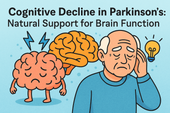
Cognitive Decline in Parkinson’s: Natural Support for Brain Function
Cognitive decline in Parkinson’s can affect memory, focus, and daily independence—but there’s hope. Understanding how the disease impacts brain chemistry opens the door to natural ways of support. From omega-3s and CoQ10 to mindfulness and exercise, you can nourish your brain, boost clarity, and slow decline through holistic care. 🌿🧠
-
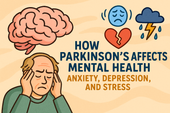
How Parkinson’s Affects Mental Health: Anxiety, Depression, and Stress
Dopamine is the brain’s spark of motivation—the chemical that fuels focus, pleasure, and drive. When dopamine levels are balanced, you feel inspired and alive; when they’re low, everything feels like an uphill climb. Understanding how dopamine works can help you support mental clarity, resilience, and emotional balance naturally. ⚡🧠
-
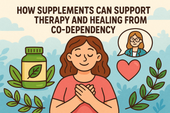
How Supplements Can Support Therapy and Healing from Co-Dependency
Biology is the science of life—an exploration of how cells, systems, and molecules create the foundation for every thought, emotion, and heartbeat. From the way our DNA shapes us to how hormones and neurons communicate, biology reveals the deep interconnectedness between mind and body. Understanding it helps us appreciate the delicate balance that keeps us alive, aware, and evolving. 🌿🧬
-
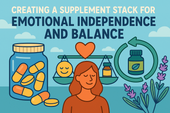
Creating a Supplement Stack for Emotional Independence and Balance
Biochemistry is the invisible language of life—how molecules, cells, and systems communicate to keep your body and mind in balance. From neurotransmitters shaping emotions to enzymes fueling energy, every process in your body reflects biochemical harmony. Understanding these reactions helps you see how nutrition, supplements, and emotions intertwine to support health, mood, and resilience. ⚗️🌿
-
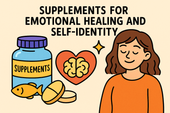
Supplements for Supporting Emotional Healing and Self-Identity
Biology is the bridge between mind and body—the science that explains how cells, hormones, and systems communicate to sustain life. It reveals how emotional states influence physical health, and how nourishment, rest, and movement keep us in balance. Understanding biology helps us reconnect with our natural intelligence and live in harmony with ourselves and the world. 🌿🔬
-
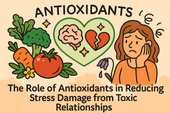
The Role of Antioxidants in Reducing Stress Damage from Toxic Relationships
Biology is the study of life in motion—the intricate dance between cells, systems, and the natural world. From DNA replication to neurotransmitter flow, every process in the human body reflects the intelligence of life adapting and evolving. Understanding this harmony helps us appreciate how nutrition, stress, and environment shape our health and emotional balance. 🌿🔬
-
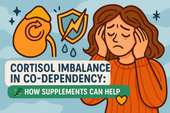
Cortisol Imbalance in Co-Dependency: How Supplements Can Help
Cortisol is the body’s main stress hormone—essential for energy and focus, yet harmful when chronically elevated. When life feels like constant pressure, cortisol imbalance can trigger fatigue, anxiety, and mood swings. Learning how to restore balance through rest, nutrition, and the right supplements can help you rebuild calm, clarity, and resilience from the inside out. 🌿💫
-
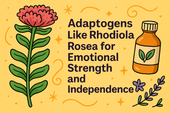
Adaptogens Like Rhodiola Rosea for Emotional Strength and Independence
Adaptogens are nature’s stress-balancing herbs—plants like Rhodiola, Ashwagandha, and Holy Basil that help your body adapt to emotional and physical pressure. They don’t numb or overstimulate; they teach your system how to find calm and stability again. By restoring balance to your hormones, energy, and mood, adaptogens nurture emotional resilience and grounded strength. 🌿✨
-
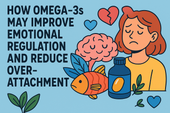
How Omega-3s May Improve Emotional Regulation and Reduce Over-Attachment
Inflammation isn’t just about sore joints or fatigue—it’s also a hidden driver of mood swings, anxiety, and emotional burnout. When chronic stress or poor diet keep the body inflamed, the brain’s chemistry changes, making calm harder to access. Learning how to reduce inflammation through nutrition, rest, and mindful living helps restore balance from the inside out. 🌿💫
-
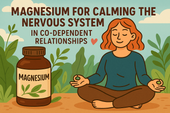
Magnesium for Calming the Nervous System in Co-Dependent Relationships
The nervous system is the body’s communication network, linking your mind and organs through a delicate web of electrical signals. It controls everything from emotional responses to muscle movement—and when it’s overwhelmed by chronic stress or anxiety, balance is lost. Learning how to calm and nourish your nervous system through nutrition, mindfulness, and rest can restore peace and emotional stability. 🌿💫
-
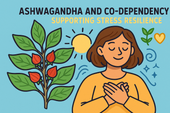
Ashwagandha and Co-Dependency: Supporting Stress Resilience
Stress is more than a feeling—it’s a full-body signal that your system is overwhelmed. When the mind races and the body tenses, your hormones, breathing, and focus all shift into survival mode. Chronic stress doesn’t just affect emotions—it reshapes your nervous system, drains your energy, and clouds your clarity. Learning to understand and manage stress gently is the first step toward peace, balance, and true recovery. 🌿💫
-

Why Co-Dependency Feels Draining: Adrenal Fatigue and Supplements That Help
The adrenal glands are small but powerful organs that sit above your kidneys, acting as your body’s built-in stress managers. They produce hormones like cortisol and adrenaline that help regulate energy, mood, and resilience. When they’re overworked from chronic stress or emotional exhaustion, fatigue and imbalance follow. Supporting adrenal health naturally can help restore calm, energy, and hormonal balance. 🌿⚡
-

The Link Between Anxiety, Co-Dependency, and Natural Support
Anxiety feels like living in constant alert mode—your heart races, your thoughts loop, and your body can’t find peace. It’s the nervous system’s way of preparing for danger, even when none exists. Understanding what’s happening in your mind and body is the first step toward calming the storm and restoring balance. 🌿💫
-

Supplements That Support Dopamine and Serotonin in Co-Dependent Patterns
Serotonin is the neurotransmitter of calm, confidence, and contentment. When it’s balanced, you feel peaceful and emotionally grounded. When it’s low, anxiety, mood swings, and emotional dependence take over. By understanding serotonin’s role in emotional health—and how to support it naturally—you can rebuild inner stability, improve relationships, and cultivate lasting happiness from within. 🌞💫
-

How Emotional Exhaustion in Codependency Impacts the Nervous System
The nervous system is the body’s communication network, connecting the brain to every organ and muscle. It regulates stress, mood, and emotion through a delicate balance of electrical and chemical signals. When overwhelmed, it can become dysregulated—leading to fatigue, anxiety, and emotional imbalance. Understanding how to calm and strengthen the nervous system is key to healing from chronic stress and emotional burnout. ⚡🌿
-

What Is Co-Dependency? The Role of Brain Chemistry and Stress
Stress is more than a feeling—it’s a full-body experience that begins in the brain and ripples through every cell. When cortisol surges and the nervous system stays on alert, your body can’t rest or recover. Over time, this constant tension affects energy, focus, mood, and even immune health. Understanding stress chemistry is the first step toward breaking free from burnout and finding calm again. 🌿
-

Creating a Supplement Stack for Motivation, Energy, and Anti-Procrastination
Motivation is the fuel behind every meaningful achievement—but it’s not just about willpower. It’s a mix of mindset, brain chemistry, and momentum. When energy, focus, and purpose align, action feels natural instead of forced. Learn how to harness motivation as a daily state, not a fleeting feeling.
-

Supplements for Building Consistency and Reducing Chronic Procrastination
Biochemistry is the bridge between biology and chemistry—the science of life at the molecular level. It explains how nutrients, hormones, and neurotransmitters interact to create energy, thought, and emotion. From brain function to muscle movement, biochemistry reveals the invisible processes that sustain health, balance, and vitality.
-

GABA and Procrastination: Supporting Calm Focus for Productivity
GABA is the brain’s natural calming messenger—a neurotransmitter that helps slow mental overactivity and ease stress. When GABA levels drop, focus fades, anxiety rises, and procrastination becomes more likely. By supporting GABA through nutrition, lifestyle, and supplements, you can restore calm clarity, improve focus, and take action with steady, balanced energy.
-

Ashwagandha and Procrastination: Lowering Stress to Improve Action
Science is the language of curiosity and discovery. It helps us understand the hidden patterns behind life, energy, and the universe. Through experimentation and critical thinking, science connects imagination to evidence—turning questions into knowledge. Whether through microscopes, molecules, or minds at work, science represents our endless pursuit of truth and innovation.
-

Neurotransmitters and Motivation: Supplements That Support Drive and Focus
Supplements can do more than boost physical health—they can also enhance mental clarity, focus, and motivation. Nutrients like omega-3s, magnesium, B vitamins, and adaptogens help balance neurotransmitters, stabilize mood, and support brain energy. When combined with good sleep, nutrition, and mindful habits, they can transform how your brain performs under stress.
-

How Stress Hormones Like Cortisol Fuel Procrastination (and What Helps)
Blood sugar isn’t just about physical health—it directly impacts focus, mood, and motivation. When glucose levels spike and crash, energy and attention do the same, fueling procrastination and brain fog. Learning how to stabilize blood sugar through balanced meals, mindful habits, and key nutrients helps keep your mind steady, focused, and ready to act.
-

Brain Fog and Procrastination: Supplements for Mental Clarity
Brain fog can turn even simple tasks into mental hurdles. When your thoughts feel slow and unclear, procrastination often follows—making focus and productivity seem impossible. This article explores the biochemical and lifestyle causes of brain fog and reveals the most effective supplements for restoring mental clarity, focus, and sustained energy.
-

The Link Between Low Energy and Procrastination: Can Supplements Help?
Neurochemistry shapes how we think, feel, and act. When neurotransmitters like dopamine, serotonin, and GABA fall out of balance, it can lead to fatigue, anxiety, or lack of motivation—fueling procrastination and low mood. Understanding the brain’s chemical communication system helps us find ways to restore focus, calm, and emotional stability through nutrition, mindfulness, and targeted supplements.
-

Why Do We Procrastinate? The Role of Dopamine and Supplements That Support It
Dopamine is the brain’s motivation messenger—the chemical that fuels focus, reward, and drive. When dopamine levels drop, even simple tasks can feel impossible to start. This article explores how dopamine shapes procrastination, motivation, and mental energy, along with natural supplements and daily habits that help restore balance and get things done.
-

Phosphatidylserine and Stress Reduction for People with BDD
Stress is more than a mental state—it’s a full-body experience that affects hormones, brain chemistry, and emotional balance. For people with Body Dysmorphic Disorder (BDD), constant tension and worry about appearance can overload the nervous system. Learning how stress works and finding ways to calm it is key to breaking the cycle of anxiety and self-criticism.
-

How Antioxidants Like Vitamin C & E Support Mental Health in BDD
Antioxidants are the body’s natural defense against stress and inflammation. For people with Body Dysmorphic Disorder (BDD), oxidative stress can worsen fatigue, anxiety, and emotional imbalance. Nutrients like Vitamin C and E help protect brain cells, boost neurotransmitter function, and support a calmer, clearer mindset—building a stronger foundation for recovery.
-

Ginkgo Biloba and Memory Support for BDD Recovery
Emotional regulation is the foundation of healing from Body Dysmorphic Disorder (BDD). When the nervous system stays in constant overdrive, even small stressors can trigger self-critical spirals. Learning to calm emotional reactivity helps restore clarity, confidence, and a sense of inner balance. By blending mindfulness, nervous system support, and self-compassion, you can retrain your brain to respond—not react—to emotion.
-

Alpha GPC and Cognitive Function in Body Dysmorphic Disorder
Mental fatigue can feel like your brain has hit a wall—thoughts slow down, focus fades, and motivation disappears. For people with Body Dysmorphic Disorder (BDD), chronic overthinking, emotional stress, and constant self-evaluation can deplete mental energy even further. Understanding what causes this cognitive exhaustion is the first step toward recovery—through rest, balanced nutrition, and targeted brain-supporting supplements.
-

N-Acetyl L-Tyrosine and BDD: Supporting Mental Clarity
Chronic stress doesn’t just affect your mood—it reshapes your brain chemistry, weakens focus, and fuels the obsessive thought loops common in Body Dysmorphic Disorder (BDD). Over time, constant cortisol elevation drains mental energy and emotional balance. Learning to recognize and manage chronic stress is essential to restoring mental clarity, self-compassion, and resilience.
-

Chamomile and Lavender for Calming Obsessive Body Image Thoughts
The nervous system is the command center of our emotional and physical world—and in Body Dysmorphic Disorder (BDD), it often operates in overdrive. Understanding how the brain and body communicate under stress reveals why intrusive thoughts feel uncontrollable. Learning to regulate the nervous system through calm practices, nutrition, and supplements helps restore inner balance and emotional safety.
-

Adaptogens for Body Dysmorphic Disorder: Rhodiola, Ginseng, and More
Rhodiola rosea, often called the “golden root,” is an adaptogenic herb renowned for boosting stress resilience and mental endurance. For individuals with Body Dysmorphic Disorder (BDD), Rhodiola may help reduce fatigue, regulate cortisol, and enhance emotional balance. By supporting both mind and body, this powerful plant promotes calm focus, improved mood, and renewed energy to face daily challenges.
-

B Vitamins for Stress Resilience in BDD: Rebuilding Calm from Within
Biochemistry is at the heart of every thought, emotion, and reaction we experience. In Body Dysmorphic Disorder (BDD), chemical imbalances in neurotransmitters like serotonin, dopamine, and GABA can amplify stress and distort self-perception. Understanding the biochemistry behind mood and stress regulation offers a path toward healing—bridging the gap between emotional experience and the body’s molecular balance.
-

Melatonin and Body Dysmorphic Disorder: Restoring Healthy Sleep Patterns
Melatonin, the body’s natural sleep hormone, plays a vital role in helping people with Body Dysmorphic Disorder (BDD) restore healthy sleep cycles. When anxiety and obsessive thinking interfere with rest, melatonin levels often drop, leading to more emotional reactivity and distorted self-perception. This article explores how melatonin works, why BDD disrupts it, and how natural supplementation—combined with mindful routines—can help the brain and body finally find calm at night.
-

Sleep Struggles with BDD: Supplements for Rest and Recovery
When you’re living with Body Dysmorphic Disorder (BDD), restful sleep can feel impossible—but the right supplements can help reset your body’s natural rhythm. From magnesium and L-theanine to 5-HTP and ashwagandha, these nutrients support relaxation, lower cortisol, and enhance melatonin production. This article explores how supplements can calm the mind, ease nighttime anxiety, and promote true restorative sleep for emotional and physical recovery.
-

5-HTP and Serotonin Balance: Could It Help with Body Dysmorphic Disorder?
Anxiety can feel like a storm inside the mind—restless, overwhelming, and hard to control. In people with Body Dysmorphic Disorder (BDD), anxiety often fuels obsessive thoughts and self-criticism, creating a painful cycle of worry and self-doubt. This article explores the biological roots of anxiety, the role of neurotransmitters like serotonin and GABA, and how natural strategies such as mindfulness, supplements, and nervous system regulation can restore calm and mental clarity.
-

Can Ashwagandha Help Ease Stress and Anxiety in Body Dysmorphic Disorder?
Neurotransmitters like serotonin, dopamine, GABA, and acetylcholine are the chemical messengers that shape how we think, feel, and react to stress. In Body Dysmorphic Disorder (BDD), imbalances in these neurotransmitters can amplify anxiety, obsessive thinking, and emotional distress. This article explores how restoring healthy brain chemistry through nutrition, supplements, and mindfulness can help bring clarity, calm, and emotional stability.
-

L-Theanine for BDD: Finding Calm in the Mind
Neurochemistry plays a central role in how we think, feel, and see ourselves. For those living with Body Dysmorphic Disorder (BDD), imbalances in neurotransmitters like serotonin, dopamine, and GABA can intensify anxiety, obsessive thoughts, and emotional distress. This article explores how regulating brain chemistry through supplements, mindfulness, and lifestyle changes can bring the nervous system back into harmony and restore inner calm.
-

Omega-3 Fatty Acids and Body Image Disorders: Supporting Emotional Health
Omega-3 fatty acids do far more than support heart health—they nourish the brain, stabilize mood, and may ease the emotional turbulence tied to body image disorders like BDD. This in-depth article explores how omega-3s regulate serotonin, dopamine, and inflammation, helping individuals reduce obsessive thoughts and rebuild self-acceptance. It also connects nutrition to therapy, mindfulness, and nervous system balance for holistic emotional healing.
-

Magnesium and BDD: Calming an Overactive Nervous System
Magnesium plays a crucial role in calming an overactive nervous system—something people with Body Dysmorphic Disorder (BDD) struggle with daily. This article explores how magnesium supports relaxation, emotional regulation, and stress reduction while diving into the science behind its connection to brain chemistry. It also examines how combining magnesium supplementation with therapy and breathwork can help rebalance the body’s stress response, reduce obsessive thought patterns, and promote lasting nervous system calm.
-

The Gut-Brain Axis and BDD: Why Probiotics Might Matter
The gut and brain are constantly in conversation — and that dialogue may shape how you experience Body Dysmorphic Disorder. By nurturing your microbiome with probiotics, prebiotics, and gut-healing nutrients, you can help rebalance serotonin, calm anxiety, and restore emotional stability from within 🧠🦠.
-
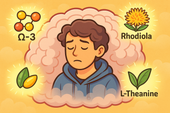
Brain Fog and Body Dysmorphic Disorder: Can Nootropic Supplements Help?
Brain fog often accompanies Body Dysmorphic Disorder, clouding focus and deepening emotional fatigue. Nootropic supplements like L-theanine, Rhodiola, and CoQ10 can help restore mental clarity, balance neurotransmitters, and bring calm energy back to the mind 🌿🧠.
-

How Stress Hormones Like Cortisol May Worsen Body Dysmorphic Disorder
Chronic stress floods the brain with cortisol — the hormone that keeps you on high alert. In Body Dysmorphic Disorder, this chemical overdrive fuels anxiety, distorts self-image, and traps the body in survival mode. Calming cortisol helps restore both peace and perspective 🌿🧠.
-

The Role of Neurotransmitters in BDD—and How Supplements May Help
Neurotransmitters like serotonin, dopamine, glutamate, and GABA shape how people with Body Dysmorphic Disorder perceive themselves. When these brain messengers fall out of balance, perception distorts — but targeted supplements can help restore calm, focus, and emotional regulation 🧠🌿.
-

What Is Body Dysmorphic Disorder? A Deeper Look at the Mind-Body Connection
Body Dysmorphic Disorder (BDD) isn’t just about appearance — it’s about perception. When brain chemistry, trauma, and stress distort self-image, the mind begins to see flaws that aren’t truly there. Healing starts by calming the nervous system and reconnecting mind and body 🪞🧠.
-
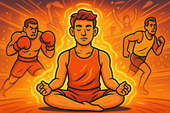
Keeping Calm in Competitive Sports: How to Train Your Mind, Body, and Chemistry for Peak Performance
Competitive pressure can overwhelm even the strongest athletes — but calm is trainable. By combining supplements like magnesium, L-theanine, and adaptogens with breathwork and mindset training, you can stay focused, balanced, and in control under any level of stress 🧠🏅.
-
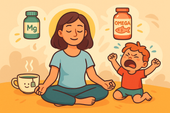
Supplements for Parents Facing Toddler Tantrums: Staying Calm When Little Emotions Run Wild
Toddler tantrums can drain even the most loving parent — but your calm is powerful. With the right supplements like magnesium, L-theanine, and ashwagandha supporting your nervous system, you can stay patient, grounded, and kind, even when emotions run high 🧸🌿.
-

Workplace Stress and Anger Management Support
Workplace stress can quickly turn into frustration — but calm is a skill you can train. By combining supplements like magnesium, L-theanine, and adaptogens with breathwork and mindset tools, you can stay focused, patient, and emotionally grounded no matter how intense the office gets 💼🌿.
-

How to Stay Patient With Family During Stressful Holidays
Holiday gatherings can stir up old stress and test your patience — but calm is possible. With nervous system support from magnesium, L-theanine, and adaptogens, plus mindful breathing and clear boundaries, you can stay centered, kind, and grounded even when family chaos unfolds 🎄💞.

















































